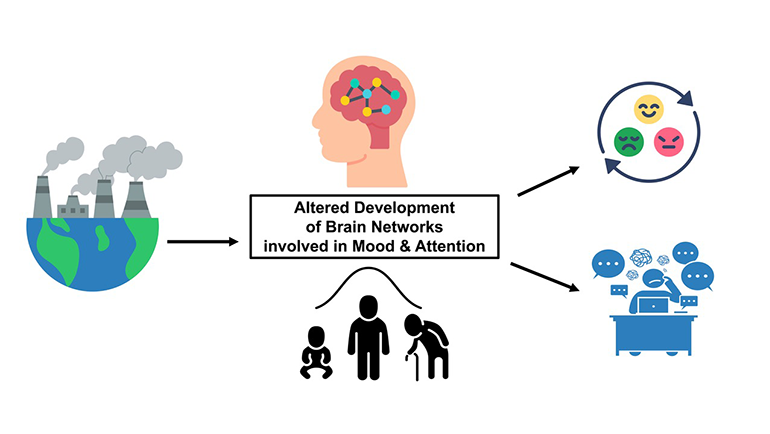
DETROIT – A new study published in the international neuroscience journal Brain Connectivity has uncovered that exposure to air pollution — specifically particulate matter, which are tiny particles in the air — can significantly impact brain development during early adolescence. This collaborative research, led by scientists from Wayne State University and Cincinnati Children’s Hospital Medical Center, sheds light on the potential risks that air pollution poses to the developing brains of teenagers.
The study, titled “Particulate Matter Exposure and Default Mode Network Equilibrium During Early Adolescence,” focuses on how these tiny particles in the air affect the brain’s resting-state networks, which are crucial for various cognitive functions. Using data from the Nationwide Adolescent Brain Cognitive Development (ABCD®) Study, researchers examined brain scans of over 10,000 children between 9 and 12 years old.
The study found that higher levels of particulate matter exposure are linked to changes in how different parts of the brain communicate. These changes in brain connectivity could influence cognitive abilities and mental health, potentially leading to issues like attention problems and emotional difficulties. The research suggests that during early adolescence, the brain is especially sensitive to environmental factors like air pollution, which can disrupt its normal development.
Air pollution is a growing concern globally, and its effects on brain and mental health are becoming more evident. This study highlights the importance of protecting young people’s health by improving air quality. Reducing exposure to harmful pollutants like particulate matter may have significant benefits for the mental and cognitive health of future generations.

“Our research is an important first step in identifying the effects of air pollution exposure on the brain, especially during an important period of development, when the brain goes through substantial changes,” said lead author Clara G. Zundel, Ph.D., a postdoctoral research fellow in the Wayne State Department of Psychiatry and Behavioral Neurosciences. “This research also underscores the need for continued regulation of air pollutants and the development of strategies to decrease or prevent exposure.”
The data brings attention to public health interventions and policy, underscoring a need to regulate the levels of pollutants in the air we breathe, the water we drink and the food we eat. This marks a paradigm shift and drives a new focus on environmental psychiatry.
“These results take the onus completely off individuals to improve their mental health,” said co-author Hilary Marusak, Ph.D., assistant professor of psychiatry and behavioral neurosciences. “While personal choices and exposures, such as ensuring we get enough sleep and physical activity, are important, Clara’s research highlights that the air we breathe can impact brain development and mental health. This isn’t surprising: We all know that breathing toxic air can harm our lungs and increase the risk of asthma; however, the notion that it also affects developing brains and could increase the risk of mental disorders is a significant finding.”
This joint study included a team of experts from Wayne State and the University of Cincinnati Children’s Hospital Medical Center in psychiatry, neuroscience, biostatistics and environmental epidemiology.
“Bringing together scientific expertise from cells to society is critical to unraveling the complexities that affect how our brains develop,” said WSU President Kimberly Andrews Espy, Ph.D. “Wayne State is leading the way in empowering health for our urban neighborhoods, one of the pillars of our Prosperity Agenda, by illuminating novel pathways that impact public health.”
